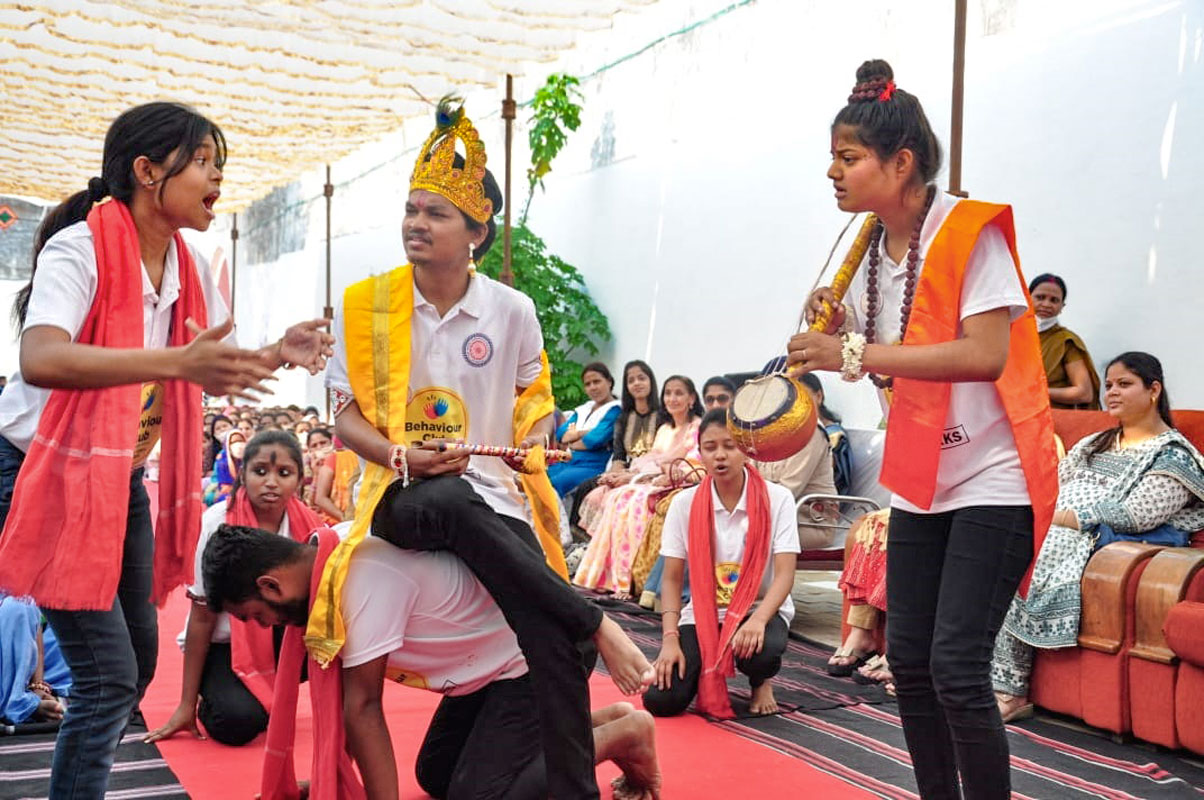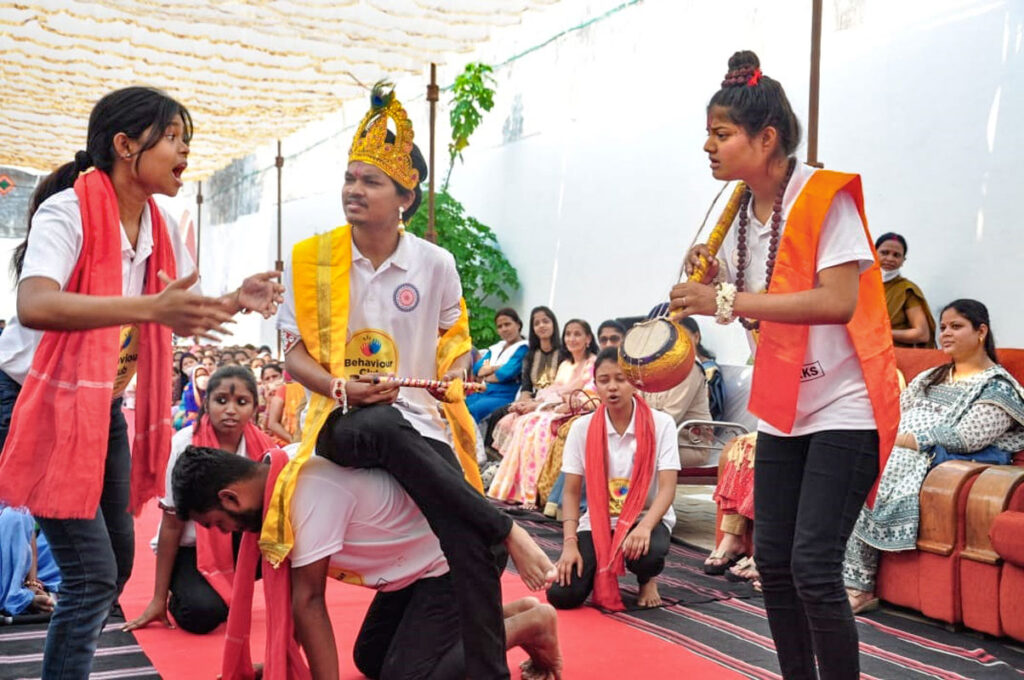
As a lawyer practising at the Chhattisgarh High Court right from its inception in 2000, Hamida Siddiqui, immediate past president of RC Bilaspur, RID 3261, had ample opportunities to visit the Central Jail of Bilaspur. Here she found that most of the women inmates — 208 in all — were in a state of depression and the younger children below six, “who are allowed to live with them are extremely unhappy and deprived of basic human rights.”
With the Central Jail exuding so many negatives… acute depression, misery, pain, unhappiness and general dissatisfaction, she started wondering about the ways in which some happiness could be infused into the lives of these misfortunate women and children.
Some of the older girls are so depressed that they look at you totally blankly… whatever you speak to them, the words seem to fall into a dark, empty space.
— Hamida Siddiqui, IPP, RC Bilaspur
Thus was born Project Khushi.
Speaking to Rotary News, Hamida said that most of the women inmates in the Bilaspur jail are there for committing murder, and the jail manual allows their children younger than six to stay with them; the older children are put up in a facility nearby which is looked after by an NGO.” While there are 20 younger kids, the older ones are 13 in number.
She explains that normally it is not easy to get inside a jail and hold conversations with the prisoners and their children. But since she is a lawyer, and deputy advocate general of Chhattisgarh State, she approached the Chhattisgarh state Legal Services Authority (CSLSA) chairperson Justice Goutam Bhaduri, and discussed with him that “during my year as president of RC Bilaspur I would like to organise an event for the jail inmates… the women, and particularly their children. This would try to bring some happiness in their lives through an opportunity to sing and dance, watch a nukkad natak (street theatre), draw rangoli, enjoy some cultural programmes, put up performances, participate in a drawing competition, etc. The idea was to bring some cheer into their gloomy lives, at least for a day or two,” recalls Hamida.
The judge readily authorised her to organise such an event on the jail premises. Before giving details of the project, she says, it is important to understand the extreme conditions under which most women have committed as grievous a crime as murdering their husbands. For long years, most of them suffer in silence and helplessness the atrocities inflected on them by their husbands and family members. They have to face cruelty and physical violence from their husbands who come home drunk; “they do not take care of the children or discharge their responsibility in the home or towards the children.” Most of the time, in sheer desperation, the woman kills the man, under whose hands she has suffered such torture. With hardly any family member coming forward to take care of the children, they end up in jail with their mothers, even though technically they are not prisoners.
But in reality, the children are indeed caged beings, growing up in an environment to which no child should be exposed. “I’ve interacted with some of the older girls who are so depressed that they look at you totally blankly… and whatever you speak to them, the words seem to fall into a dark, empty space,” she says.
The irony is that the male inmates are relatively happy. They are found laughing and having fun, but the women’s section is ignored and they are visibly unhappy.
Asked if the depressed women and children do not have access to psychological counselling, she smiles wryly and says: “Yes, technically, it’s all available, but most of it is mechanical and comes nowhere near the care that the mother and father can give. Only sensitive eyes can see this; if you can’t even see the prevalent depression, how will you give relief or treatment?”
In this background, Hamida took the idea to her club members to plan and execute the two-day Project Khushi. With Hamida personally organising the funding, and several club members supporting the event by gifting the materials required, such as clothes, gifts for the children, stationery for the drawing and painting competitions and other items required, the Bilaspur Central Jail was totally transformed for two days in May.
“The jail was decorated with lights and flowers as though there was a wedding ceremony happening there. You should have seen the happiness that the women exuded; we cannot take them out because of the grievous crimes they have committed, but we could certainly give them two days of some happiness, in a life which is so sad, gloomy and filled with depression and little hope for the future.”
Claiming that this event was a first-of-its-kind in any jail in India, Hamida says the entire women’s cell was lit up and decorated in bright colours. The day started with a yoga and meditation session. The women participated in various competitions like singing, dancing, applying mehndi and rangoli, “and we were amazed to see how talented they are, particularly in singing and dancing.”

For the children, there was plenty of fun and frolic. They participated in events such as dancing, drawing, sketching, marble race, and fancy dress competition. On the second day, they thoroughly enjoyed the puppet and magic show. Sewing machines, books, study material, stationery and crayons, balls, bats, carrom board, badminton rackets, etc were distributed to the women and children. A mini library was also set up for the kids and the women.
A play was performed by the Behaviours Club of Guru Ghasidas University on the alarming and serious issue of depression and drug abuse. The event was presided over by Justice Bhaduri and attended by both the police and jail superintendents.
But is this going to be a one-time event, and what about the children’s future, I ask Hamida. “I would love to repeat this project this year too, and am discussing it with this year’s club leaders. It will be great if this event is held in perpetuity, the women really need something like this. We also gifted them a harmonium, so that they can have some entertainment.”
Hamida then describes a disturbing phenomenon; gender discrimination. “The irony is that the male inmates are relatively happy. They have so many things… sewing machines, harmoniums, etc, and are found laughing and having fun, but the women’s section is ignored and they are visibly unhappy. I am a mother of three daughters; women’s issues is very important to me,” she adds.
Emotionally, the children are so confused… everyone is coming and giving them something. There is not much dignity in always taking things from people. They need a respectful way of living.
This lawyer is now thinking how to help the older children living in a nearby building and being looked after by an NGO. She is trying to support the older children; take out some of the children from here and place them into regular hostels and schools. They are not aware of their origin or roots; the religion and community to which they belong. “I’m not saying that religious divisions are good, but it is good to have an identity and know your roots. Emotionally, they are so confused… everyone is coming and giving them something. There is not much dignity in always taking things from people. They need a respectful way of living… in a hostel or boarding school.”
Hamida adds: “Without parents, children have a totally different kind of life. They have emotional bankruptcy, no emotional connections; mechanically they have food, sleep, study, but without care, affection and security there are chances of their turning into future criminals. We know that all serial killers have had a very disturbed childhood.”
The task ahead is daunting but she is happy that for at least two days the club was able to make the women happy. “The media gave the event wide coverage and the women were so happy. I was really touched when one of them said ‘Aap ne hamare liye itna socha, hum aapka shukriya ada nahi kar saktey (We can’t thank you enough for thinking of us). And seeing the media coverage, another said: “Aap ne hamey itni izzat di ki hum paper mei aaye (You gave us so much respect that the newspapers wrote about us). There is not much we can do to help women whose bail has been refused… some of them have been here for 14 years. But I am happy that our club, through this project, was able to recognise those who have lost their identity.”
Let’s end this article with a smile. During the fancy dress competition one of the children enacted the famous scene from a Hindi movie with the classic dialogue on delayed justice: Tareekh pe tareekh; court me yehi milta hei, magar insaaf nahi milta. (All we get are dates in courts; not justice). That left Justice Bhaduri, who was presiding over the event, laughing!












